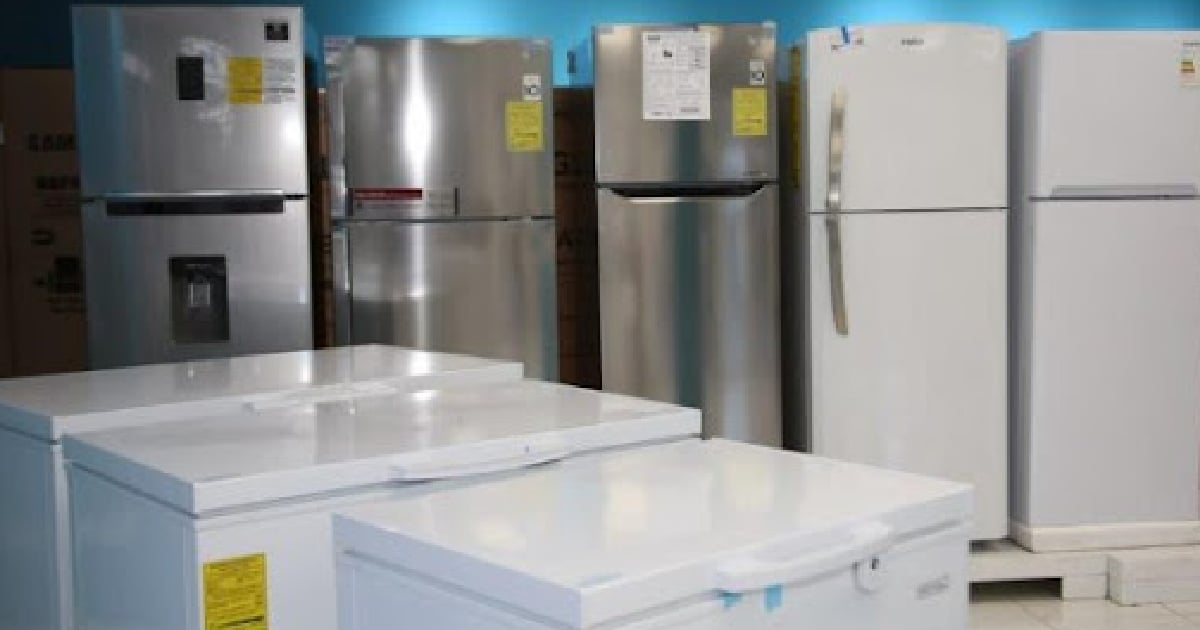
The Cuban government will restrict the import of high-consumption appliances to legal entities on the island with commercial purposes, amidst a continuous wave of power outages due to deficits in electricity generation that the Cuban regime itself has been unable to resolve.
For this purpose, the National Office for the Control of the Rational Use of Energy (Onure) is preparing a new resolution, following in the footsteps of two current ones since 2021 (No. 235 and 236), to prohibit the entry of goods with high specific electricity consumption, as pointed out in a report by the official newspaper Granma.
According to the senior specialist of Onure René Martín Páez, this new government measure aims to regulate the household appliances that can be imported and marketed in the country, especially in Tiendas Caribe, Cimex, and Palco, as well as for micro, small, and medium enterprises, known as SMEs.
Martín Pérez said that they aim to contribute significant savings to the National Electric System and to the clients' own economy, as stated in the report.
Among the data to support his claim, the specialist stated that if the population changes their resistance cooktops to induction ones, the country would save 760 thousand tons of fuel per year, and avoid the emission into the atmosphere of an amount of carbon dioxide equivalent to 2.3 million tons.
He also argued that LED luminaires have the potential to save 200 thousand tons of fuel and avoid 600 thousand tons of carbon dioxide annually, considering all the consumption on the island.
The specialist pointed out among its advantages that they consume between 35 and 40 percent less than fluorescent lamps, as well as that their lifespan can last at least five times longer.
The different stages of the energy crisis that Cuba has been experiencing for years have led the government to take improvised measures in order to minimize the impact on the service being so recurrent among the population. Nevertheless, complaints about the prolonged power outages are constant among Cubans.
In 2021, the General Customs of the Republic of Cuba issued Resolution 273/2021, published in the Official Gazette, which gave the green light to the importation of household appliances with higher energy consumption for individuals on the island for non-commercial purposes, amid an energy crisis that was also a trigger for the historic demonstrations on July 11 of that year.
One year later, the Ministry of Finance and Prices (MFP) published Resolution 218/2022 authorizing the importation of electric generators with higher power than those previously allowed to enter the island under the provisions of the General Customs.
The provision authorized, in an exceptional manner, "the non-commercial importation, above the established value for air, sea, postal, and courier shipments, of electric generators with a power exceeding 900 watts, which are presented for customs clearance by the General Customs of the Republic until December 31, 2022." This measure was recently extended again until September 30, 2024.
In 2022, during a meeting with the top authorities of Holguín, it was reported that Prime Minister Manuel Marrero sent a document with measures to reduce electricity demand, including regulating the importation of compact incandescent light bulbs and electric resistance cookers.
The energy crisis in Cuba has intensified in recent years, characterized by prolonged blackouts that can last more than 15 hours in some provinces.
The authorities, unable to find a definitive solution to the problem, seek justifications in "scheduled maintenance", but some experts believe it is a structural crisis.
The main causes of power outages are the lack of investment and maintenance in the electrical infrastructure, the dependency on imported fuels to generate energy, and the shortage of fuels.
What do you think?
COMMENTFiled under: